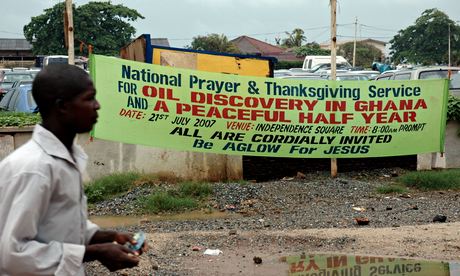
The phrase "striking oil" carries two dictionary definitions: the formal, to "discover petroleum while digging for it"; and the informal, "to become very rich or successful". In real life, the two aren't always as neatly tallied.
The story of West Africa's oil rush over the past half-century or so painfully illustrates the mixed fortunes that so-called black gold can bring. Nowhere is its tarred hand more in evidence than Nigeria, the continent's largest crude oil exporter.
The populous African nation has become a byword for what economists refer to as the "resource curse". Endemic corruption and poor public governance have seen billions of dollars in oil revenue simply disappear. After nearly six decades of oil production, Nigeria languishes in 153rd place (out of 187 countries) in the United Nation's Human Development Index.
Enter Ghana. The West African country hit "lucky" in 2007. A bold exploration gamble by Dallas-based oil firm Kosmos Energy turned up a huge oil field about 60km off the Ghanaian coast. With a whopping 600m barrels of light crude in estimated reserves, the Jubilee Field catapulted the country into the oil game.
Big Men, which was screened at the Human Rights Watch Film Festival in London earlier last week, picks up the story. What unfolds is a deftly chronicled depiction of what happens when Africa, oil and Wall Street meet. Despite some artful cinematography and a colourful cast (replete with bejewelled tribal chiefs, sharp-suited investors and daredevil prospectors), the result isn't a pretty sight.
"It's every entity for itself", says Rachel Boynton, the documentary's US-based director. This desperate scramble for personal gain marks a binding motif of the movie. "In that sense, conflict is inevitable."
Yet must oil and conflict necessarily be so entwined? Repeated scenes from Nigeria's Delta region offer precious little succour. Boynton dives intrepidly into the country's oil-stained bad lands, bringing back tales of oil theft (or "bunkering" as it's called in the trade), sabotaged pipelines and gun-touting gangs.
A scene midway through the film presents a glimmer of hope. It's 2008, two years before oil begins to flow and Kosmos has funded a conference on the future direction of Ghana's oil industry. A tatty banner at the meeting hall entrance declares "Oil – a Blessing. Not a curse…".
The camera takes us inside, where a representative from Norway is describing his country's oil development strategy. His advice is twofold: firstly remember that oil belongs to Ghanaians; and secondly tax foreign investors as much as possible. Norway has ploughed its oil profits into a ring-fenced sovereign wealth fund. The fund, which is now valued at over 5,000bn Krone (£500bn), is a big part of the reason that the oil-rich state now occupies top spot in the UN's benchmark development rankings.
Ghana has not proved deaf to such counsel. Boynton, who describes herself as an "optimistic realist", points to the country's adoption of a variety of public petroleum funds in 2011. The funds, which are governed by the finance ministry, are designed to promote economic diversification and to finance future development, as well as provide a cushion against shortfalls in public revenues.
Africa's newest petro-state has bucked another trend in terms of revenue disclosure. The Ministry of Finance commits to publish a detailed analysis of petroleum receipts and their allocation every six months. The country has put its name to the Extractive Industries Transparency Initiative as well.
"That level of transparency really does give me hope because that is what will make the difference. And there's lot of incentive for people to not be open on all sides," says Boynton.
The future of Ghana's oil-sponsored development aspirations is by no means secure, however. Although the country boasts its own national petroleum corporation, Ghana remains heavily dependent on the expertise and capital of foreign investors such as Kosmos. That restricts its ability to strike the best terms.
The country's first full set of annual revenue accounts reveals a worrying imbalance too. Ghana pocketed $444m (£267m) in tax and royalties, the 2012 report reveals, compared with over $2bn (£1.2bn) collected by its private sector partners.
Ghana would have been in line to receive an additional $389m (£234m) were it not for the "non-realisation of corporate income tax" – the result of one of many contractual sweeteners insisted on by its foreign investors. Ghana's public accounts committee raises concerns over the non-payment of surface rental charges as well.
Oil production and its impact on developing countries has proved a popular subject matter for documentary makers in recent years, as films such as Crude and A Crude Awakening testify. Boynton brings an informed, balanced and in parts entertaining eye to what is a complex subject.
As to whether Ghana has done enough to stave off the curse of sudden resource riches, Big Men refuses to pass verdict. "You just don't know", says Boynton. "And you won't know for at least ten years." Ambiguous endings weaken any film, but at least strong grounds exist for a sequel.

